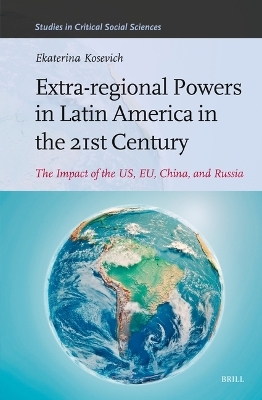
Extra-regional Powers in Latin America in the 21st Century
Brill (Verlag)
978-90-04-71339-0 (ISBN)
- Noch nicht erschienen (ca. Dezember 2024)
- Versandkostenfrei innerhalb Deutschlands
- Auch auf Rechnung
- Verfügbarkeit in der Filiale vor Ort prüfen
- Artikel merken
Latin America and the Caribbean (LAC) is a unique region, with a sharply changing political and ideological orientation from a “left turn” to a “right curve", which means it is difficult to build stable and predictable international relations with the region. At the beginning of the 21st century, we witnessed a sharp increase in interest in LAC from extra-regional powers that, due to historical, cultural, and geographical factors, traditionally did not have strong ties with the region.
The 2020s is a time of competitive and systemic rivalry, when the value of each individual partnership, union, or alliance is increasing. In this regard, this wave of interest in LAC is not caused by a desire to expand trade and investment presence, but by the desire of new actors in the Americas to use the region to gain greater global geopolitical influence.
This book addresses the question: What role do extra-regional actors—the US, China, the EU, and Russia—play in the new system of international relations formed in LAC at the beginning of the 21st century? Ultimately, the book opens up a new multilateral perspective on the role and place of LAC in global processes in the context of the interaction and confrontation between the worldviews of the West and the non-West.
Ekaterina Kosevich, Ph.D. (2019), is a Senior research fellow and Associate Professor at HSE University in Moscow. She is a specialist on Russia and Russian politics in Latin America. Her book Mexico in the System of Geopolitical Coordinates of the Beginning of the 21st Century ([in Russian] 2020) has been recognized with two awards from the Russian Foundation for Basic Research and HSE University (Moscow).
Acknowledgments
List of Figures and Tables
Introduction
1 Latin America in the System of International Relations: The Evolution of Theoretical Concepts
1 Understanding the Theoretical Basis of the Foreign Policy of Latin American Countries
1.1 1950–1970: A Realist Approach to Autonomy and Integration
1.2 Autonomy and Integration in the 1980s: Development from Within
1.3 1990s: The Primacy of the Relational Approach
1.4 The beginning of the 21st Century: A Clash of Two Trends
1.5 World Order 2.0: Liquid Autonomy and Niche Integration
2 Latin America’s Approaches to Multipolarity
2.1 Latin America: Multipolarity through the Lens of Autonomy and Integration
2 Inter-American Relations at the Beginning of the 21st Century
1 US Foreign Policy in lac at the Beginning of the 21st Century: Innovation and Continuity
2 US Security and Defense Policy toward Latin America: Ensuring an Enduring Influence
2.1 Tracing the Evolution of the US Security and Defense Policy toward Latin America
2.2 The Biden Presidency
3 China and lac in the New Global Context
1 “Fast and Furious” Strategy: Chinese Foreign Policy in lac
1.1 History of the China–lac Relationship
1.2 The Institutionalization of Cooperation
1.3 Military-Technical Cooperation
2 Chinese Trade and Investment Presence in lac: Main Spheres of Influence
2.1 Trade
2.2 Investment
2.3 The Belt and Road Initiative and lac
2.4 China’s Current Investment Presence in lac
4 The European Union as a Player in Latin America
1 Three Institutions for Multilateral Cooperation in eu-lac Relations
1.1 Political Dialogue
1.2 Assistance
1.3 Trade
1.4 Cooperation during New Global Challenges
1.5 Perception of the EU’s Regional Policy by Residents of Latin America
2 eu–lac Relations: The Priority of Economics over Politics
2.1 Trade and Economic Relations between the EU and lac
2.2 The EU, Mexico, and Chile
2.3 The EU, Colombia, Peru, and Ecuador
2.4 The EU and the Caribbean
2.5 The EU and Central America
2.6 The eu–mercosur Agreement
5 Russia and lac
1 The Place of Latin America in Russia’s Foreign Policy Interests at the beginning of the 21st Century
1.1 Political Dialogue
1.2 Defense and Security Cooperation
1.3 Trade Relations
1.4 Cultural and Humanistic Cooperation
1.5 Russia–Latin America Relations in the Context of the Ongoing Global Systemic Transition
2 Russia’s Zones of Political and Economic Activity in lac
2.1 Traditional Partners
2.2 Ideological Allies
2.3 Trade Partners
2.4 Low Priority Countries
6 Where Are the Extra-regional Powers in Latin America Going?
References
Index
| Erscheint lt. Verlag | 19.12.2024 |
|---|---|
| Reihe/Serie | Studies in Critical Social Sciences ; 304 |
| Verlagsort | Leiden |
| Sprache | englisch |
| Maße | 155 x 235 mm |
| Gewicht | 1 g |
| Themenwelt | Sozialwissenschaften ► Politik / Verwaltung ► Europäische / Internationale Politik |
| Sozialwissenschaften ► Soziologie | |
| ISBN-10 | 90-04-71339-5 / 9004713395 |
| ISBN-13 | 978-90-04-71339-0 / 9789004713390 |
| Zustand | Neuware |
| Haben Sie eine Frage zum Produkt? |
aus dem Bereich


